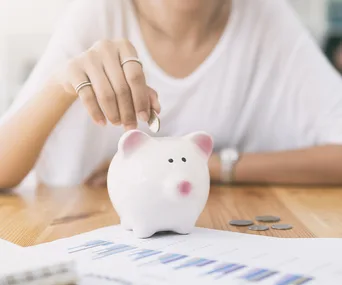
Is ‘budget’ a dirty word in your household? The truth is tracking your spending is the secret to financial independence – a wise move considering 40 per cent of older single retired women live in poverty in Australia.
Here, we show you how to make budgeting your new BFF.
1. Start small
If you’re new to budgeting, don’t be too ambitious. Ease yourself into new habits rather than trying to get your finances into shape in one go. Money experts say it can take three to four months to learn how to get a budget right.
2. Don’t go it alone
There are plenty of online budget tools and apps to help you get started, if doing the sums isn’t your favourite thing in the world. MoneySmart’s budget planner is easy to use and ideal for anyone getting started on improving their financial wellbeing.
3. Look at the big picture
“Budgeting is really good for building financial wellbeing by helping you manage your money effectively,” says Nathalie Spencer, from CBA’s Behavioural Economics team.
“You’ll want to think about your inflows and outflows – how much you typically need for bills and necessities, commitments like debt repayments and what you’d like to regularly put away for savings.”
4. Go month-to-month
Financial demands change so it’s important to adjust your budget to accommodate any extra expenses for the month – ahem, Christmas, for instance. At the beginning of each month, tweak your budget so you can factor in that month’s extra commitments – whether that’s car rego or a birthday present – and avoid any nasty surprises.
5. Streamline
“Good financial wellbeing means having your ‘everyday’ spending under control, as well as having a little bit of money saved for a ‘rainy day’ or unexpected expense, and taking steps to securing your ‘one day’ future,” says Nathalie.
Once you’ve determined what that mix looks like for you, the next step is to set up automatic transfers into separate accounts just after pay day. This way, your ‘rainy day’ and ‘one day’ money isn’t tempting you to spend by sitting in your everyday account.
6. Get real
“Consider your discretionary or everyday lifestyle spending, too,” says Nathalie. “Are you comfortable with this amount or are there areas where you’d like to cut back?”
Collect all your bills and bank statements to get a clear idea of your spending habits. Budgeting for those things you enjoy, such as eating or going to the movies, is just as important as saving but it will be probably be necessary to adjust your lifestyle to cut back some of those expenses.
Even reducing the number of takeaway coffees you buy each week or restricting how much you spend on clothes will go a long way to keeping you financially healthy.
7. Keep an eye on it
It’s easy to set and forget your budget but the greatest success comes from regularly checking your progress – it’s also a chance to pat yourself on the back for a job well done!
It takes time to break bad habits and overspending is no exception. But by keeping a close on your budget you’ll be able to notice any red flags and nip them in the bud.
To help improve your financial wellbeing, please visit financiallyfitfemales.com.au. Proud partner, CommBank. Always consider your personal circumstances before acting on financial advice
.jpg?fit=900%2C751)

